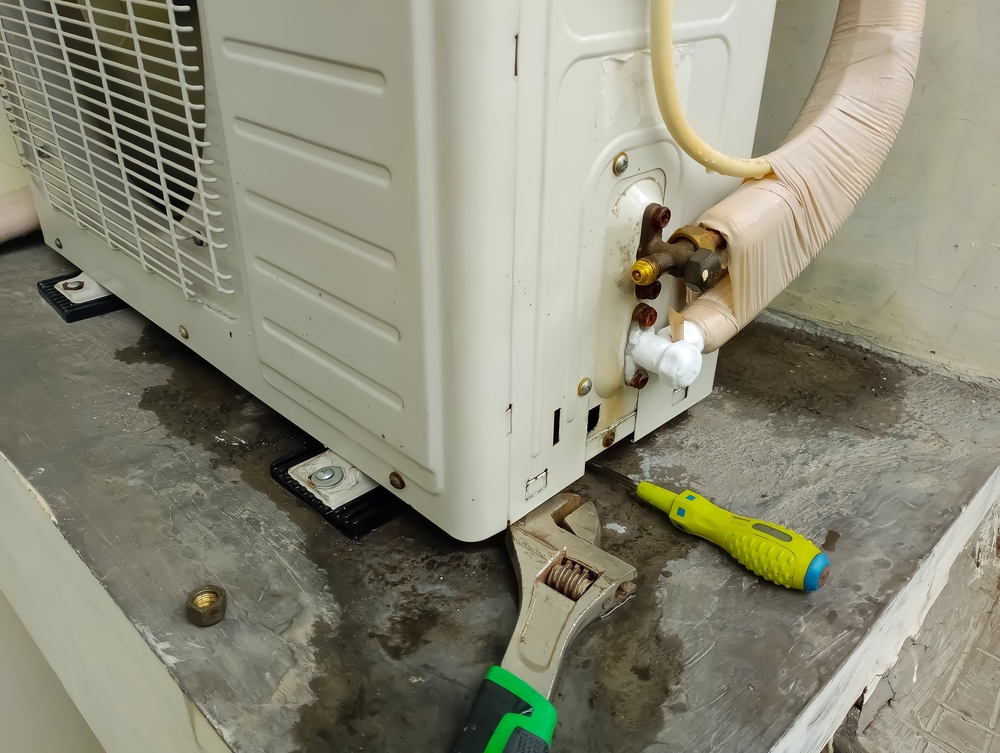Air conditioner leaks are a common issue that can cause significant concern for homeowners. Repairing air conditioner leaks is important to help prevent further damage and maintain the efficiency of your cooling system. Choose an experienced AC repair company in Orlando, FL, if you are facing a leaking AC.

Causes of a Leaking Air Conditioner
Clogged Drain Line
One of the most frequent causes of water leaks in air conditioners is a clogged drain line. The drain line removes the condensation produced by your air conditioner’s evaporator coil. Over time, dirt, debris, and algae can accumulate, blocking the drain line and causing water to back up and leak. Regular cleaning and maintenance of the drain line can prevent this issue.
Dirty Air Filters
Dirty air filters can lead to a variety of problems, including water leaks. When air filters are clogged with dust and dirt, they restrict airflow over the evaporator coil. This restricted airflow can cause the coil to freeze. When the ice melts, the excess water can overflow the drain pan. Regularly checking and replacing air filters is vital for maintaining proper airflow and preventing leaks.
Low Refrigerant Levels
Low refrigerant levels can cause the evaporator coil to become too cold and freeze. When the ice melts, it can overflow the drain pan, leading to water leaks. This issue not only causes leaks but also affects the cooling efficiency of your air conditioner. Low refrigerant levels typically indicate a leak in the system, which requires professional attention to repair and recharge the refrigerant.
Broken Condensate Pump
In some air conditioning systems, a condensate pump is used to remove water from the drain pan. If this pump is malfunctioning or broken, it won’t be able to remove the water effectively, causing it to leak out of the unit. Inspecting and maintaining the condensate pump can ensure it’s functioning properly and prevent water leaks.
Blocked Air Vents
Blocked air vents can restrict airflow and cause the evaporator coil to freeze. When the ice melts, it can overflow the drain pan and lead to water leaks. Ensure that all air vents are unblocked and free of obstructions to maintain proper airflow and prevent freezing. Timely repair and maintenance will prevent issues such as air conditioner water damage.
Cracked or Rusted Drain Pan
The drain pan collects condensation from the evaporator coil and directs it to the drain line. Over time, the drain pan can develop cracks or rust, leading to water leaks. Inspecting the drain pan for damage and replacing it if necessary can prevent leaks.
Improper Installation
If your air conditioner was not installed correctly, it might not be level. An unlevel unit can cause water to flow incorrectly and spill out of the drain pan. Ensuring proper installation is crucial to prevent leaks and other operational issues. Always hire experienced and certified technicians to install your air conditioning system.
Step-by-Step Guide to Fixing AC Leaks in Orlando
- Turn Off the Power: Before attempting any repairs, ensure the power to your air conditioner is turned off to prevent any electrical hazards.
- Check and Clean the Air Filters: Inspect the air filters and replace or clean them if they are dirty. Clean filters improve airflow and prevent the evaporator coil from freezing.
- Inspect the Drain Line: Locate the drain line and check for any clogs. Use a wet/dry vacuum to remove any blockages, or flush the line with a mixture of water and vinegar to clear out any debris.
- Ensure Proper Refrigerant Levels: Low refrigerant levels require professional attention. Contact a licensed HVAC technician to check and refill the refrigerant if necessary.
- Evaluate the Condensate Pump: If your system uses a condensate pump, ensure it’s functioning correctly. If the pump is broken, it may need to be repaired or replaced by a professional.
- Confirm Correct Installation: Check if your air conditioner is level. If it isn’t, you may need to adjust the position or call a professional to reinstall the unit properly.
Preventative Measures
- Regular Maintenance: Schedule regular AC maintenance to ensure all components are clean and functioning correctly. This can help prevent leaks and other issues.
- Timely Inspection of Components: Regularly inspect key components such as air filters, drain lines, and the condensate pump. Early detection of potential problems can prevent leaks and costly repairs.
- Annual Professional Servicing: Have your air conditioner serviced by a professional at least once a year. A comprehensive check-up can identify and address any issues before they become major problems.
Why Choose Downtown Air and Heat
Experienced and Licensed Technicians
Downtown Air and Heat employs experienced and NATE-certified technicians who can diagnose and fix air conditioner leaks efficiently.
Comprehensive Service Offerings
From installation to maintenance and repair, Downtown Air and Heat offers a full range of HVAC services to keep your system running smoothly.
Customer-First Approach
Customer satisfaction is a top priority at Downtown Air and Heat. We are committed to providing high-quality service at an affordable price, ensuring your home remains comfortable year-round.
Orlando’s Leading HVAC Contractors are Here to Help You
For any air conditioning issues, trust our Orlando AC repair, maintenance, and installation experts at Downtown Air and Heat to provide reliable solutions. We are a full-service HVAC company providing high-quality services for all your residential air conditioning, heating, indoor air quality, ductwork, and commercial HVAC needs. For 24-hour emergency service, call us at 407-408-7105 or schedule a service online.








